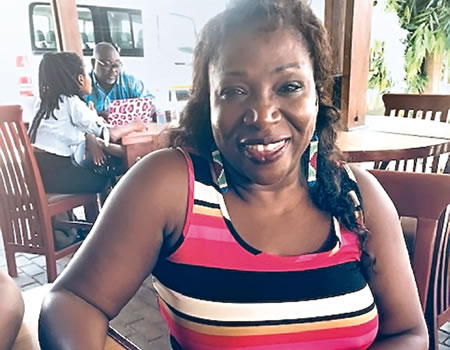Bisi Adjapon is a Ghanaian linguist and writer who once worked in the United States and several embassies. Her debut novel, “Of Women and Frogs,” was recently published by a Nigerian publisher. In this interview by KINGSLEY ALUMONA, she speaks about her novel, literature and immigration issues.
COULD you briefly tell us something about yourself?
I’m a linguist with dual degrees in French and Spanish. I’m also a former International Affairs specialist for the United States Foreign Agricultural Service, former journalist and former Instructor at the Diplomatic Language Services. I’m just a writer doing what I love. Now I birth stories I hope people will enjoy.
PHOTOS: Aisha Buhari flaunts her ‘Four More Years’ tattoo
You are a Ghanaian. How come you bear a Nigerian Yoruba name, Bisi?
My mother is Yoruba and I was actually born in Abeokuta. My parents wanted me to have names that reflected my Nigerian and Ghanaian heritage. So, I’m Adebisi. Just call me Bisi.
You studied French and Spanish. What inspired you into creative writing?
I’ve been writing since I was a little girl. So, there wasn’t anything in particular that inspired me or something that ignited my writing. I’ve always been a writer first, but had no illusions about making a living out of it. I also love learning languages. So, it seemed sensible to pursue both. Studying literature is part of language studies. I studied literature through the ages in both French and Spanish.
Your recently published debut novel, “Of Women and Frogs”, was first published as a short story in McSweeney’s Issue 38 in 2011 with the same title. What motivated you to expand it into a full novel?
By the time I finished the short story, my protagonist, Esi, had become so real to me I was unwilling to let her go. I asked myself how her earlier experiences would affect her. I felt compelled to breathe more life into her and see where she’d go.
Could you briefly tell us what the novel is about?
It’s both an emotional and sexual journey of a girl into adulthood, while navigating family and social dynamics, romance and political turmoil.
Your main character, Esi, a half-Nigerian girl growing up in post-colonial Ghana, ends up questioning the hypocrisy of the adults around her, who places restrictions around her because she is a girl. Does this, in any way, encapsulates your upbringing?
Not really. People ask that often. I never experienced any ginger in the vagina, for instance. While Esi’s stepmother isn’t a bad person, mine was truly lovely. I was fortunate to have a woman who loved and understood me. The similarities between Esi and me are mainly geographical and contextual. Mind you, elements of nonfiction tend to creep into fiction. The beauty of fiction is that you can let your imagination run wild and have fun.
About the book, you were quoted as saying, “The subject of sex and gender disparity has always fascinated me.” In this regard, what is your take on feminism?
When it comes to sex, society expects women to be the sole pillars of chastity and virtue without which society will crumble. Women have blood flowing through their veins, blood that nourishes their nerve endings just like men. It boggles my mind that we judge women so harshly. Women are just as capable of experiencing sexual frustration and are just as susceptible to lust as men are.
Most people believe that the best African novel is one replete with suffering or tragedy. Did you have this in mind, for or against, while writing your novel?
I can’t think of anything sillier than ensuring one has suffering in a novel because one is from Africa. I write the story I want to tell. It may or may not involve some pain or any other emotion. Africans are like other humans. We are free to write about every aspect of the human experience, as well as fantasy. Most of my essays are humorous. In “Of Women and Frogs,” there are tears, anger and loads of laughter.
Why did you settle for Farafina Books for your debut novel? Were there any rejections from other local or international publishers before Farafina?
I wanted to be first published by an African publisher. It’s that simple. I feared an American or European publisher might try to shape the story to fit a western narrative. I remember writing something and being told it wasn’t African enough, as though authentic African literature has to feature excessive misery. I submitted to Farafina because I knew their books. I was in Ghana when Farafina brought copies of “Purple Hibiscus” over. It thrilled me that a Nigerian publisher had taken such a bold step to tell our stories. Ghanaian publishers were focused primarily on educational books. I discovered other publishers after Farafina had already accepted my work. I have to say Farafina has done s fantastic job with my book. My agent and I have started receiving feelers from international publishing houses.
What plans do you have, perhaps with your publisher(s), to make your book a bestseller?
I’m not sure how to answer this. “Of Women and Frogs” is already a Book nook bestseller in Ghana. Our problem is satisfying the demand out there. So far, the book has done well through word of mouth. I hope to visit Nigeria and do readings. I’ll be on Classic FM 97.3 at 9 pm Nigerian time. Audiences seem to enjoy hearing me read and talk about the book. I’ll also be touring Senegal, Kenya and Botswana. In addition, I might participate in the Barelit Festival in the United Kingdom.
As a writer of various literary genres, what is your creative and writing processes like?
I don’t really have a creative process. I write when I’ve something to say.
In the 2018 Ake Festival, you were one of the members of the panel “Been-To and Homecoming” As someone who once lived in the United States, did you experience racism or discrimination that made you homesick?
For the past eighteen months, I’ve been living in Ghana. Yes, I faced racial prejudice in America but only in subtle ways. You notice it in the way a white woman clutches her purse tighter or scurries away from a shopping aisle because you’ve entered it. Northern Virginia and the D.C. area is diverse, so I didn’t experience blatant discrimination. I used to get homesick though. No matter how much technology you enjoy abroad or how comfortably you live, there is no substitute for the taste of roasted plantain and groundnuts, the sun searing your arms in December, the thumping of music in the streets and the sound of senseless laughter. Even the vociferous arguments spell home to me.
As a writer who has worked in many countries, do you think literature has a role to play in curbing immigration problems?
I’m not sure how to answer this. Literature has a role to play in every aspect of life. Certainly some writings about life in foreign countries might shed light on the downside of immigration, both legal and illegal.
What are you currently working on?
Funny you should ask about immigration. I’m writing a creative non-fiction story about a legal immigrant in America who becomes illegal. I’m very excited about it because it deals with complex issues like race, religion, adoption and the concept of home.
Currently, apart from writing, what other job or career demands your time and energy?
None. I’m a full-time writer.
What is your greatest challenge as a writer? And, what do you do in your leisure?
My biggest challenge is focusing on my work. I tend to get easily distracted. I have to learn to hide my phone and plug my ears. It’s easier when I’ve a deadline. I write all day and all night.
What advice do you have for young people, especially the female ones, who are aspiring to be like you?
Aspire to be the best you. Don’t aspire to be like anyone else. Whatever your passion is, pursue it with everything you have. Work hard and also take time to connect with those you love. Apart from that, there are no rules.






